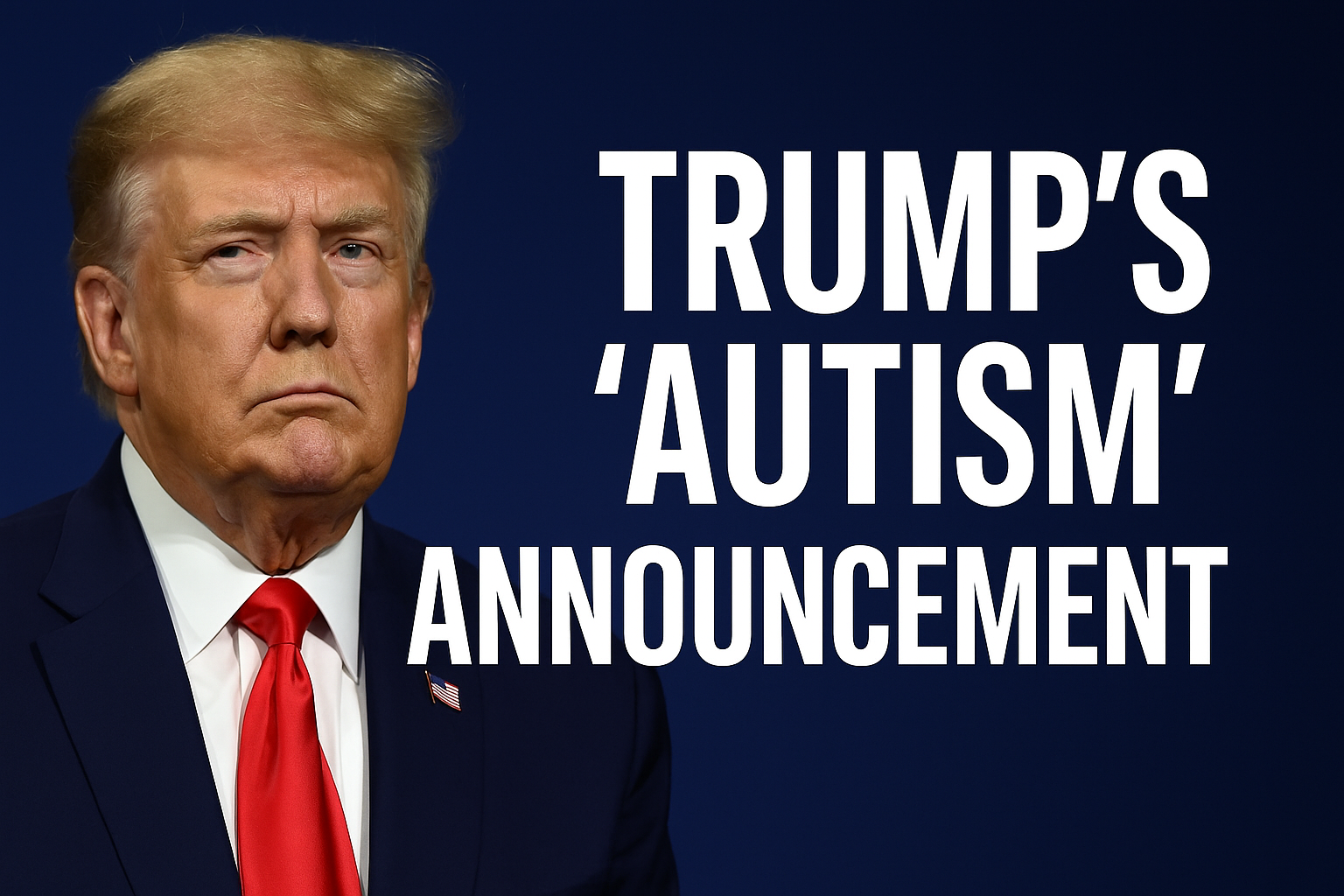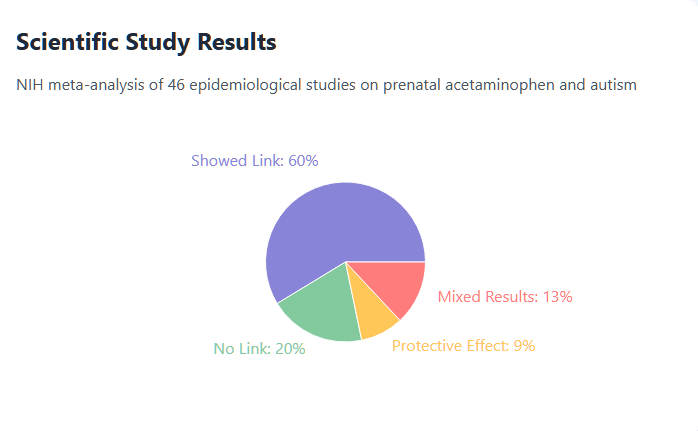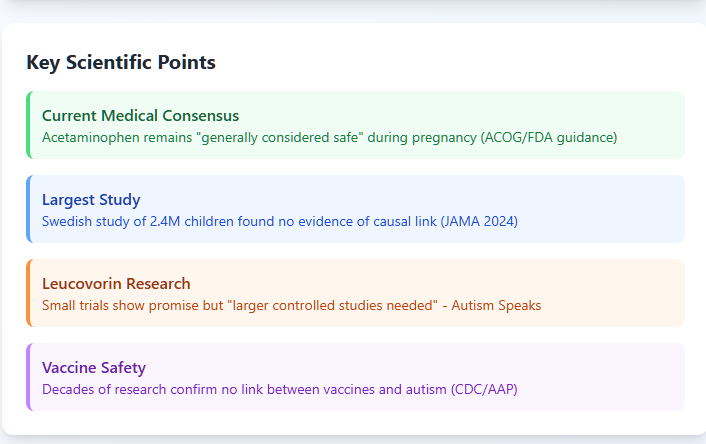Address
304 North Cardinal St.
Dorchester Center, MA 02124
Work Hours
Monday to Friday: 7AM - 7PM
Weekend: 10AM - 5PM

President Donald Trump has repeatedly teased a “massive” announcement on autism scheduled for Monday, Sept. 22, 2025. Speaking at the memorial service in the wake of the assassination of Charlie Kirk, he vowed an “announcement on autism” that “we can’t let people keep doing” when referring to pregnant women’s medication use. The promise has sent Washington and media into a frenzy. It comes amid reports that HHS Secretary Robert F. Kennedy Jr. plans to link prenatal use of Tylenol (acetaminophen) and low folate levels to autism risk – a finding contrary to current medical guidelines that say Tylenol is safe during pregnancy. RFK Jr. is also rumored to tout leucovorin (folinic acid) as a potential treatment for autism symptoms, based on a few small trials.
The announcement is unprecedented: never before has a U.S. president promised “breakthrough” autism findings. Its political weight is enormous. Autism and vaccines have become hot-button issues in right-wing populist politics, and Trump’s highlighting of them plays to that base. By promising a major new discovery, Trump aims to position himself as a crusader against “Big Pharma” and government secrecy – a common populist trope. It also ties into the broader “Make America Healthy Again” (MAHA) agenda RFK Jr. has been pushing in the administration. In recent months Kennedy has vowed to “know what caused the autism epidemic” by September, and Trump has prodded him publicly for results. The timing – as Trump continues to face internal squabbles with the Republican Party – suggests a bid to energize the MAGA base by addressing a longstanding conspiracy-laden grievance (childhood autism) with a high-profile government intervention.

While President Trump historically avoided anti-vaccine rhetoric (even forcing Trump Organization staff to vaccinate in 2021), his second term has brought a stark shift. He has embraced RFK Jr., an avowed vaccine skeptic, as HHS Secretary, and signaled support for Kennedy’s controversial views. In December 2024, Trump told NBC’s Meet the Press that he shared “some of the concerns” voiced by Kennedy on childhood vaccines and autism. He even repeated debunked statistics (claiming autism rose from 1 in 100,000 to 1 in 100 over 25 years) and suggested vaccines might be “a pretty bad number” for autism rates. Such statements mirror RFK Jr.’s long-held “vaccines cause autism” narrative – a position at odds with decades of peer-reviewed scientific and medical research.
As HHS head, Kennedy has thrown the weight of the Trump administration into investigating autism, vaccines, and childhood health. His MAHA report (released Sept. 9) calls for prioritizing vaccine injury research and probes of autism causes. In it, Kennedy promised massive new data mining – combining insurance claims, health records, even wearables – to find the “cause” of autism. He has publicly described a growing “autism epidemic” driven by “environmental toxins.” and critics note this mirrors anti-science tropes: conflating rising diagnoses (due to awareness and changing criteria) with a supposed mysterious new toxin. Major autism experts and organizations have repeatedly stressed that no single epidemic driver has been identified.
Trump’s late-2025 surge of attention on autism dovetails with his broader populist-health messaging. He frames it as exposing a cover-up by the medical establishment and pharmaceutical companies. In political terms, this pleases two constituencies: the anti-vaccine activists now in power (RFK Jr.’s allies) and the populist base that distrusts elites. By championing a purported “breakthrough,” Trump can boast a big win for worried parents and implicitly blame “Big Pharma.” At the same time, this tactic risks alarming moderate Republicans and rallying Democrats who will portray the move as fringe pseudoscience. So far, Trump has insisted he’s merely waiting on scientific proof (saying “I think we found an answer to autism” at a rally), but the line between fact and hype is thin.

Even before the Monday announcement, right-wing and anti-vax channels have lit up with speculation and misinformation. Conservative influencers and conspiracy groups have whipped up hashtags like #TylenolAutism and claims of a “cover-up” by health authorities. A Washington Post analysis found references to Tylenol and autism spiked on pro-Trump media in August 2025: mentions of “Tylenol” were 15 times more common among MAHA-aligned influencers than earlier in the year. On X (formerly Twitter), accounts like Laura Loomer and podcasters have urged followers to “NEVER give your baby Tylenol,” seizing on any suggestion of risk. Loomer posted a clip claiming that if Tylenol use in pregnancy is singled out “it could offer a simple step to curb the Autism epidemic in America” – echoing the trope of an easy “cure.”
Anti-vaccine groups are leading the narrative. Children’s Health Defense (Kennedy’s former group) ran misleading posts asserting a “3.5x” or even “80% spike” in autism risk from prenatal acetaminophen exposure. Moms Across America – another well-known antivax group – shared an old claim that acetaminophen triples autism risk, and urged parents to “embrace the fever as a healing tool” instead. Such messages often pair Tylenol warnings with their core belief that vaccines (and medicines) are hidden dangers. For example, Dr. Robert Malone – a Kennedy appointee now on a vaccine advisory panel – publicly speculated (on OAN/One America News) that Trump’s report might link autism to a “combination of Tylenol in the very young together with … things that are pro-inflammatory, like… multiple vaccinations.” Malone’s prediction, widely shared in fringe circles, has no evidentiary basis and was later publicly disavowed by himself as mere “speculation.”
These narratives are being amplified across social platforms as political disinformation. On Facebook and messaging apps like Telegram, coordinated clusters of influencers have pushed identical memes: one example on Instagram asked, “Is this a possible Big Pharma cover-up?” alongside a doctored WSJ headline. Twitter (X) searches reveal trending hashtags such as #AutismCure and #EnvironmentalToxins being used interchangeably with Tylenol claims. MAGA accounts, and even some libertarian wellness groups have been highly active on this subject. Some posts are bot-like in activity: dozens of accounts re-post the same graphs or sensational headlines within minutes, boosting visibility. On Trump’s Truth Social, allies have touted the impending news as “historic” and baited Democrats to respond, turning it into a partisan meme war.
Key frames include:
The coordination is evident: for example, within hours of the WSJ leak, dozens of X accounts (many linked to each other) reposted identical clips and hashtags to drive trending topics. Conservative media outlets (Fox News, One America News, Newsmax) have eagerly covered any rumor or fringe claim alongside official reporting. Fox Business immediately led with headlines about Tylenol stock plunging when news broke, while Fox News showed clips of Dr. Marc Siegel sounding alarms. Even reality-checked images have been doctored – one viral meme swapped the WSJ logo for “CNN,” claiming “FAKE NEWS.” All of this creates a high noise-to-signal ratio around the autism story.
In sharp contrast, the scientific consensus is that acetaminophen has not been shown to cause autism. Decades of clinical research have found no causal link between standard vaccine or drug exposures and autism. As one Group of scientists put it in 2021 (Nature Reviews Endocrinology): pregnant women should use acetaminophen prudently, but it remains the safest fever reducer. Current ACOG/FDA guidance – echoed by Medical News Today – says acetaminophen is “generally considered safe” during pregnancy. (Failure to treat fever, by contrast, can itself harm fetal development.)
Academic studies paint a mixed picture but no consensus: some observational studies (which cannot prove causation) reported slight associations between prenatal acetaminophen and later autism risk, while others found none. For example, an NIH-funded meta-analysis in 2025 reviewed 46 epidemiological studies: 27 showed a link between prenatal acetaminophen and neurodevelopmental issues, 9 showed no link, and 4 even suggested a protective effect. Its lead author stressed, “We show that acetaminophen is associated with a higher risk, but not causing it… The risk may be due to underlying conditions (e.g. fever/infection) that prompt its use.” In other words, women taking Tylenol might be sicker (with flu or other inflammation), which itself could influence fetal brain development.
The strongest evidence against any causal link came from a massive Swedish study (JAMA 2024): following 2.4 million children, researchers used sibling comparisons and found no evidence that prenatal acetaminophen use causes autism. Experts say this effectively rules out any large effect. They emphasize that autism’s rise is largely explained by broader diagnoses and screening, plus complex genetics and environmental interplay. A leading autism researcher told FactCheck: “There is no one cause of autism… a complex mixture of genetic and environmental risk factors.”
Regarding leucovorin (folinic acid), the evidence is intriguing but very limited. Leucovorin, a form of folate, can cross into the brain even when some folate receptors are blocked. Small clinical trials (often funded by autism advocacy groups) have shown symptom improvements in subsets of autistic kids – especially those with folate receptor autoantibodies. For example, a 2018 molecular psychiatry trial found that high-dose folinic acid for 12 weeks significantly improved verbal communication in language-impaired autistic children, with the strongest gains in those with these autoantibodies. A 2024 pediatric study (India) similarly reported reduced autism severity scores in the leucovorin group. Autism Speaks notes these as promising preliminary findings, cautioning that “larger controlled clinical trials are needed to determine its efficacy and safety.” In short, leucovorin is considered an off-label experimental therapy – not a proven cure – and mainstream medicine has not adopted it as standard care. Specialists remind families that most children respond well to behavioral and educational therapies, and that any supplement “should be discussed with a doctor.”
Finally, on vaccines and autism, the consensus remains rock-solid: no vaccines cause autism. This has been established by dozens of global studies over many years. The original 1998 Lancet paper linking MMR vaccine to autism was retracted, and extensive research since has shown no difference in autism rates between vaccinated and unvaccinated children. U.S. agencies (CDC, FDA) and medical academies (ACOG, AAP) all reaffirm that childhood immunizations are safe and do not trigger autism. As the CDC bluntly states, delaying vaccines “leaves your child unprotected during the time when they need vaccine protection the most.” Even now, despite political pressure, agencies caution that “recommended vaccines are proved to be safe and effective.”
In summary: rigorous science holds that Tylenol is safe in pregnancy under guidancemedicalnewstoday.com; current evidence does not support it as an autism causereuters.comwashingtonpost.com. Leucovorin has shown benefits in very small trials for some subgroups, but it is not a broadly accepted autism treatmentpubmed.ncbi.nlm.nih.govautismspeaks.org. Vaccines remain unlinked to autism, with decades of confirming datawashingtonpost.comstatnews.com. Thus, if Trump’s announcement echoes the anti-vaccine and anti-medical narratives of RFK Jr. and fringe influencers, it will run directly contrary to mainstream science.
In the short term, Trump’s autism announcement is likely to fuel confusion among parents and patients. Misinformed mothers might panic and shun acetaminophen entirely, leaving common fevers or pain untreated — ironically risking more harm than using the drug. Anti-vaccine sentiment could spread further, as families see Tylenol warnings and think “If not vaccines, then this?” Already 1 in 6 U.S. parents say they have skipped or delayed a recommended childhood vaccine, often out of fear of side effects. Amplifying a new (unfounded) scare may encourage even more hesitation. A Virginia pediatrician warns that such narratives undermine trust in FDA/WHO/ACOG guidance at a time when infant and pregnancy care needs public confidence. We may see increased demand for alternative “natural” treatments for fever, or off-label autism “therapies” sold by fly-by-night supplement shops.
Politically, Trump may reap some gains. He will have signaled loyalty to RFK Jr.’s coalition (appeasing its most fervent followers) and given his base another culture-war issue. RFK Jr. himself is likely to bask in the limelight, claiming vindication for his years of anti-vax crusading. This could neutralize criticism that the administration is indifferent to childhood health concerns. On the other hand, mainstream media and medical experts will surely push back – as FactCheck and the Washington Post already have – framing Trump’s claims as medically baseless. Democrats and moderate voices will seize on any confusion to portray the administration as pandering to conspiracy theories.
In the long run, the stakes could be higher. If this narrative takes hold, it normalizes turning health science into politics, opening doors for more disinformation. Observers worry about “public health whiplash”: one week pregnant women get mainstream advice from NIH/ACOG, the next they hear a presidential directive against it. This back-and-forth can erode trust in institutions. It may spur copycat claims (e.g. linking autism to other legal products, or alleging conspiracies about other birth defects). OSINT analysts will need to watch for new hashtags and networks that emerge (for example, movements to ban Tylenol or mandate folinic acid supplementation). Internationally, anti-vaccine groups abroad might echo the story to bolster their own causes, so global social media should be monitored for sudden spikes in these themes.
Conservative influencers are already using slogans like “#StopTylenol” and “TylenolAutismTruth”. Watch for visuals equating “health freedom” with Tylenol avoidance. Also track any memes framing leucovorin as “Autism vitamin” or “child-speech cure”. Memes asking “Big Pharma wouldn’t let you know about [X]” often presage the next claim.
The likely domestic outcome: a brief political win for Trump and RFK Jr, stoking their base’s distrust of officials, followed by a tide of corrective journalism. In the coming weeks, OSINT efforts should monitor: (1) Trump’s actual announcement content vs. leaked teasers;
(2) how vaccine hesitancy metrics respond in polls;
(3) any spikes in online searches or purchases of alternatives (e.g. herbal fever remedies, leucovorin supplements); and
(4) RFK Jr.’s next moves on autism (he may double down or pivot to related topics).
Maternal health forums (postpartum groups, pregnancy subreddits) could be ground zero for anecdotal panic or questions, so they merit close listening. Finally, pay attention to international reactions – disinformation networks in Europe, India, etc., might pick up the U.S. news to bolster local anti-vax narratives.
In sum, this episode appears to be a politically driven effort to inject a fringe health claim into mainstream discourse. The scientific consensus remains unshaken: acetaminophen in pregnancy is considered safe, leucovorin is an experimental adjunct at best, and vaccines do not cause autism. OSINT watchers will be on alert to see if Monday’s “announcement” changes this picture – or simply spreads disinformation further.